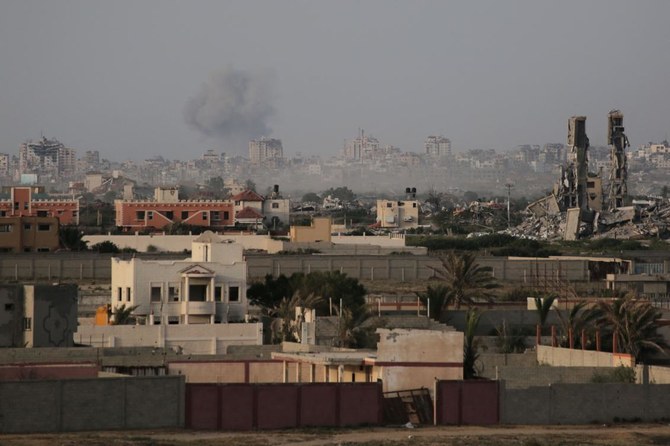GAZA: An Israeli strike killed 31 people in central Gaza Sunday, the Palestinian territory’s civil defense agency said, as US National Security Adviser Jake Sullivan visited for talks on the conflict.
Israeli troops have moved in on the Gaza Strip’s far-southern city of Rafah, which the army describes as the last Hamas stronghold and where the United States says 800,000 civilians have been newly displaced by the fighting.
Hamas’s armed wing, the Ezzedine Al-Qassam Brigades, said it was targeting Israeli forces stationed at Rafah crossing — a vital conduit for humanitarian aid that is now closed — with mortar fire.
Israel has also fought and bombed resurgent Hamas forces in northern and central areas of the coastal territory previously considered to be under army control, sparking US warnings that it could become mired in a lengthy counterinsurgency campaign.
In the latest aerial bombardment overnight, Gaza’s civil defense agency said an Israeli strike killed 31 people and wounded 20 in a home in the central Nuseirat refugee camp.
Israel’s military, which on Sunday reported its aircraft had “struck dozens of terror targets” over the past 24 hours, said it was checking the reports.
Witness Yasser Abu Oula told AFP an entire residential complex “was destroyed” and “there are still bodies under the rubble.”
Israel’s Prime Minister Benjamin Netanyahu has vowed to keep fighting Hamas in Gaza, following its October 7 attack that sparked the war, until the group is defeated and all remaining hostages are released.
But he has faced intense opposition and calls to announce a plan for Gaza’s post-war governance — from top ally Washington, from mass street protests and now also from members of his war cabinet.
Centrist politician Benny Gantz threatened Saturday to quit the governing hard-right coalition unless Netanyahu approves a post-war “action plan” by June 8.
Amid the political turmoil, Sullivan met his Israeli counterpart Tzachi Hanegbi and Netanyahu in Jerusalem for talks on the brutal Gaza conflict and post-war scenarios.
The US embassy released video footage from the meetings, but did not elaborate on Sullivan’s discussions with Israeli officials.
Gantz demanded steps to defeat Hamas, to bring home the hostages, and toward forming an “American, European, Arab and Palestinian administration that will manage civilian affairs in the Gaza Strip.”
Netanyahu dismissed Gantz’s comments as “washed-up words,” saying they would lead to “a defeat for Israel” and “the establishment of a Palestinian state,” which he fiercely opposes.
Washington has pushed for a post-war plan for Gaza involving Palestinians and supported by regional powers.
US President Joe Biden called Sunday for an immediate Gaza ceasefire and said he was pushing for a regional peace deal “to get a two-state solution, the only solution.”
The Gaza war broke out after Hamas’s unprecedented October 7 attack on Israel, which resulted in the deaths of more than 1,170 people, mostly civilians, according to an AFP tally based on Israeli official figures.
Hamas also took about 250 hostages during the October 7 attack, of whom 124 remain held in Gaza including 37 the army says are dead.
Israel’s retaliatory offensive against Hamas has killed at least 35,456 people in Gaza, also mostly civilians, according to data provided by the Hamas-run territory’s health ministry.
Israel has imposed a siege on the long-blockaded Gaza Strip, depriving its 2.4 million people of normal access to clean water, food, medicines and fuel, the suffering eased only by sporadic aid shipments by land, air and sea.
The head of the UN agency helping Palestinians said that “despite all the calls by the international community not to launch an offensive in Rafah, in reality an offensive started on May 6.”
Since then, “we have again about half of the population of Gaza being on the road forced to flee” for safety once more, though “we keep saying there is absolutely nowhere to go,” UNRWA chief Philippe Lazzarini told reporters in Amman.
“There is absolutely no safe place in the Gaza Strip,” he added.
Lazzarini said that because of the fighting, “almost nothing in terms of aid is crossing” into Gaza, raising fears that recent gains made “to prevent a looming famine ... might quickly be reversed.”
Truck arrivals have slowed after the Rafah crossing with Egypt closed when Israel launched its operation in the city.
After a series of attacks on Gaza-bound trucks in Israel, a group of Israeli activists on Sunday traveled with an aid convoy to protect it, an AFP correspondent said.
“Each truck can be the one tool that saves the life of a five-year-old child,” said activist Oshra Bar, 36.
Aid has also begun entering via a temporary US-built floating pier, where shipments sent from Cyprus are offloaded for distribution.
The United Arab Emirates said Sunday a shipment of “252 tons of humanitarian relief supplies for the people of Gaza was successfully unloaded” after arriving from the Cypriot port of Larnaca.
The UN’s humanitarian chief Martin Griffiths warned that if dire fuel shortages are not alleviated, the “famine which we have talked about for so long, and which is looming, will not be looming anymore. It will be present.”
“Our worry ... is that the consequence is going to be really, really hard,” he told AFP in Qatar. “Hard, difficult, and apocalyptic.”



























